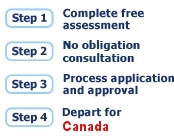In order to find employment when you arrive in Canada, think carefully about where you want to live and where the best prospects are for job opportunities in your occupation.
Original documents from your home country are very important to your job search in Canada. While you are preparing to immigrate, you can obtain documents that describe your education and work experience. Bring the original versions of your documents. Some organizations may ask you for documents directly from institutions in your home country. This may take time and cost money. Education documents are records from your secondary school, college, or university. These include degrees, diplomas, and certificates. Program descriptions, transcripts, or detailed course information can also be useful. Bring documents that explain your past work experience, such as job descriptions, employment records, performance evaluations, letters from employers and work supervisors, and descriptions of training that you have completed. Finally, find out if your occupation in Canada is regulated or non-regulated. A regulated occupation will require a licence whereas a non-regulated occupation does not.
There are hundreds of immigrant-serving organizations all across the country. Many are staffed by former newcomers to Canada, who understand the challenges that immigrants may face. They usually have people available who speak your language and can accompany you as interpreters. Citizenship and Immigration Canada supports many of these organizations financially, helping newcomers adapt to life in Canada. They provide free resources to help you prepare for work, get language training, education and other job skills training, and look for a job.
There are things you can do to help yourself find work. If possible, have your documents translated into English or French before you leave for Canada. You should have a résumé stating your education, work and volunteer experience, and your skills and qualifications. Also bring your diplomas, degrees, certificates and other qualifications, letters of recommendation and your school records or transcripts. Taking steps to improve your language skills in English or French is also very beneficial.
To be better prepared to look for work in Canada, have your credentials evaluated and compared with the Canadian education system to make it easier for employers to determine whether you meet their job requirements. If you are a professional in government-regulated occupations, contact the licensing body in the province of destination.
Share








